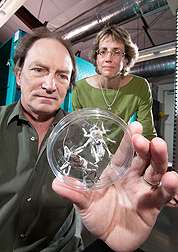Scientists study immune system for better mormon cricket control

(PhysOrg.com) -- Better understanding of the Mormon cricket's immune system could help identify when microbial control agents will be most effective against this pest, according to a U.S. Department of Agriculture (USDA) scientist and cooperators.
Like its grasshopper cousin, the Mormon cricket plagues farmers and ranchers in the Northern Plains during the summer. Cricket infestations can wipe out acres of grasses and field crops through their voracious feeding. They also pose a danger to drivers when their crushed bodies build up on highways and create road slicks.
Entomologist Robert Srygley, with the Agricultural Research Service (ARS) Northern Plains Agricultural Research Laboratory in Sidney, Mont., is studying the Mormon cricket's immune system to determine its most vulnerable stage during development. This will help identify when biocontrol agents will be most effective in curbing infestations. ARS is USDA's principal intramural scientific research agency.
The researchers have found that a young Mormon cricket will sacrifice the growth of its immune system to allocate more resources for physical growth. Enzyme assays have also revealed that the immune system is weakened with each molt, when the insect sheds its exoskeleton as it grows larger. At the adult stage, the Mormon cricket no longer molts and therefore no longer needs to compromise its immune system. Based on these findings, it seems ideal to apply biocontrol agents during the insect's immature or early-adult life stages.
Srygley also conducted field experiments with university colleagues to compare protein-fed Mormon crickets with carbohydrate-fed ones. They found insects lacking enough protein in their diets were deficient in an enzyme key to combating fungi. Similarly, crickets lacking enough carbohydrates in their diet were deficient in an enzyme involved in fighting bacteria. Details of this study have been published in Ecological Entomology.
Srygley plans to further study this phenomenon by rearing carbohydrate- and protein-deficient crickets in the laboratory. He hopes this knowledge will help scientists identify which microbial control agents would be most effective to use against this seasonal pest.
Provided by USDA Agricultural Research Service















